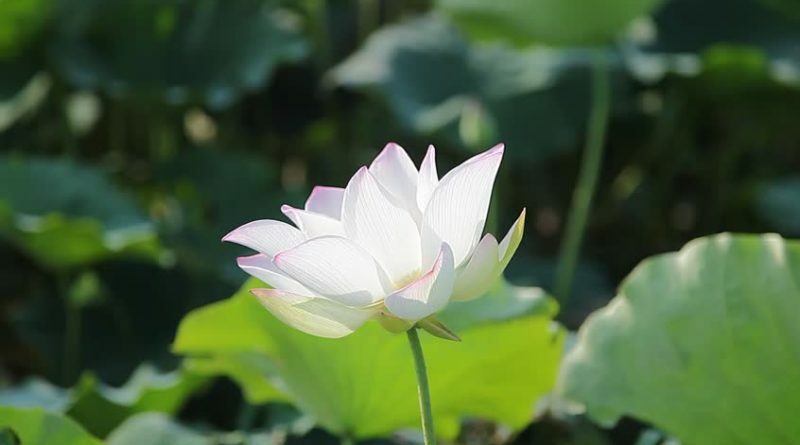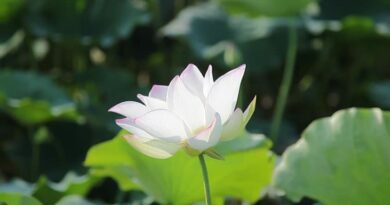FREEDOM UNDEFINED
Freedom Undefined
There’s a passage in the Dhammapada where the Buddha says that life as a householder is difficult, life as a monk gone forth is difficult. Then he ends by saying, “So be neither.” Of course, what he means by that is to find a way of not having to be anything at all. That requires practice. It’s a skill — the skill we’re working on right here, the skill that takes you out of having to live the household life or have to live the life of a monk. Without this skill, those are the only choices you have. Derived from them are lots of other little choices, but they’re all trapped inside those two categories.
What we’re looking for is a path of practice that leads to freedom from any kind of category at all. As the Buddha said, what you are is limited, measured by what you cling to. So the path beyond categories has to be a path that gets rid of clinging. When you hold onto the body, that’s what you are. When you hold onto any of the other aggregates, you’re classified as a feeling-clinger, a perception-clinger, a mental-fabrication-, or consciousness-clinger. You create your identity by what you cling to. This is why the Buddha never answered questions about what a human being is, because a human being can be almost anything.
So this noble eightfold path that we’re following here is a path that gets us out of having to be identified with anything, of having to be limited to anything. That’s the skill we’re working on. It’s not an easy skill, but when you realize that all of the alternatives out there are difficult, then you realize that it doesn’t make much sense to focus on the difficulties of the path, for at the very least this is a path that leads to a way out.
Three years ago, when I sensed that Ajaan Suwat was about to pass away, I went to see him in Thailand. It was inspiring and heartening to see him, because even though he went through a lot of difficulties after his accident — paralyzed from the base of the spine on down, brain damage, lung damage, having to deal with very difficult people looking after him — he always maintained his good cheer. One of the last things he said to me was that he had begun to notice that the perceptions his brain was sending to him were getting weirder and weirder all the time. He had to learn how not to listen to them. Then he said, “But that thing I got from the meditation: That hasn’t changed. That’s always there.”
“That thing” is what he called it. That’s the freedom we’re working toward, so that no matter what happens in terms of aging, illness, and death, there is always “that thing” there. That’s what we want to ferret out. That’s what we want to know. So we foster the customs of the noble ones, which focus on taking delight in this path, this path of letting go and developing. You let go of the patterns of thought, speech, and action that get in the way of clear knowing. You develop the qualities that encourage clear knowing: Right View, Right Effort, Right Mindfulness, Right Concentration. You learn to take enjoyment in these things. You let them capture your imagination.
They’ve done studies of people who are expert in fields involving skill and dexterity, and they’ve discovered that what sets the experts apart from people who are just good at those skills is that the skill captures their imaginations. One, they like doing it; two, they like rising to the challenge. If they make mistakes, they try to learn from them. One article tells of the admissions office in a very famous school of surgery. For years they were working on the questions asked at the applicant interviews to try to figure out which questions would ferret out the people who didn’t have the potential to be surgeons as opposed to those who did. Because it was one of the best schools in the country, all the applicants had great grades, great recommendations, but that was no guarantee that they’d actually do well when faced with a patient on the table.
The admissions people discovered a pair of questions that were most accurate in figuring out who to admit and who not to admit. The first was: “Can you tell us about a mistake you made recently?” If the applicant said, “No, I can’t think of any mistakes I made recently,” he or she would be rejected. The second question was: “What would you do differently if you had the chance to do it again?” If the person was able to jump right in and say, “I thought that next time around I might try this,” that was the sort of person they wanted — someone who would look at his or her actions, recognize a mistake, and then immediately want to figure out how to not make that mistake again, someone who exercised ingenuity in trying to figure out another approach.
All across the board, the ones who excel at their skills — whether as musicians, sportsmen, or craftsmen — are the ones who find that the skill captures their imagination. That’s why the effort put into the skill is no big deal for them. They get so absorbed that the effort becomes enjoyable. They like thinking about it, they like figuring out the problems they face, and sometimes detecting problems that other people might not even notice. Then they try working out solutions. These are the kind of people who do well.
The same principle applies in the customs of the noble ones. You delight in letting go, you delight in developing. Working on the qualities of your mind really captures your imagination. That way, the difficulties of living in a community with other people who are also practicing aren’t big issues. You’ve got the rules; you’ve got the structure; you’ve got the support to do the practice. It’s not so much that you’re here to learn about Buddhism; you’re learning to use the tools that Buddhism offers to sort out your own mind. First the tools help you look at the habits, the things the mind is doing. Then, when you notice that what you’re doing is causing suffering to yourself or other people, you have the tools to change those habits. If the classic tools don’t work, you can use your own ingenuity to extrapolate on them. When you find that that captures your imagination, then the difficulties don’t really impress themselves on your mind.
The whole purpose of this practice is to focus on what’s actually happening in your mind. The big questions are, “What are you doing that’s causing unnecessary suffering for yourself or for other people? What can you do to stop doing that?” These questions apply not only to things you do and say, but also the way your mind operates, the way the mind treats itself, the way it deals with its own thoughts and feelings. You want these questions to take charge.
This requires a shift in your center of gravity, because for a lot of us, we have a strong sense of who we are, with our activities as something secondary, something in service of the “who” that we are. If we take our sense of our self, of who we are, as the absolute, then the question of what we’re doing becomes relative. Then the preferences of that self take over, and the path becomes hard. But if you switch things around so that the question of becoming more skillful in your actions becomes your absolute while your sense of who you are becomes relative to that question, then the path becomes a lot easier. It’s a lot more enjoyable. It makes sense.
This is why the Buddha focused his four noble truths on precisely this question, because that’s what the four truths are: an issue of skillful action, desirable result, unskillful action, undesirable result. They’re a way of sorting those issues out. As for the other questions — concerning the world, the oneness or plurality of the universe, the existence of a self, the nature of the life force, the fate of an awakened person after death: Those questions get set aside. Those are not the issues. The issues are what is skillful, what is not.
When those questions become the center of your concern, when they capture your imagination, then issues of world and self fall to the wayside. This gives you a beginning sense of what it’s like to be freed from the question of who you are, what kind of person you are, because you realize that those issues are all determined by the skill with which you act, particularly the skill with which you approach your clingings, your attachments. Those are the determining issues. When you learn how to practice, developing concentration and discernment to see through those clingings, then the whole need to identify yourself, limit yourself, measure yourself. goes by the wayside. As you follow the path, the sufferings caused by the need to define yourself grow lighter and lighter. Even more so when all the clinging is gone: That’s it — no need to be defined by anything at all.
There’s a passage where a monk has been asked by some people from outside of the Buddha’s teachings about how the Buddha answers the question of whether the awakened person exists or not after death. The monk, extemporizing, answers that there has to be an answer beside the four that are usually given: existing, not existing, both, neither. His questioners all make fun of him. “You don’t know anything about the Buddha’s teaching,” they sneer. Even people outside the teaching knew that. So the monk goes to see the Buddha. The Buddha says, “How can you say anything like that? Can you identify where the Tathagata is right now? Can you define him in terms of any of the five aggregates?” Well, no. “As something separate from the five aggregates?” No. There’s nothing that you could point to, even here in the present moment — unlike your ordinary person, who can be identified with his clingings. The Buddha went on to say, “When you can’t even identify the Tathagata here and now, how can you say anything about what he is after death, or how he exists, or what his mode of being is after death?”
Total freedom. Indescribable and undefined. That’s what this practice is all about. If the idea of total freedom captures your imagination, then the difficulties get smaller and smaller. Even though they may be large in your mind right now, they start looming smaller and smaller as you stick with the path.
The Buddha once said that if you could make a deal that every day for 100 years you’d be speared with 100 spears in the morning, 100 spears at noon, 100 spears in the evening — 300 spear-wounds every day — but with a guarantee that in 100 years you’d gain full Awakening, that would be a deal worth taking. When the Awakening came, you wouldn’t consider that it had been gained with difficulty.
It’s up to you to decide whether you find that passage intriguing. Then again, you can look at the alternative: what life is like if you don’t.



